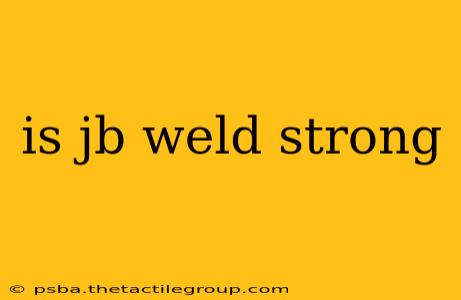JB Weld is a popular epoxy adhesive known for its incredible strength and versatility. But just how strong is it? The answer isn't a simple number, as its strength depends on several factors, including the specific type of JB Weld used, the surface being bonded, and the curing process. This article delves deep into the strength of JB Weld, exploring its capabilities and limitations to help you determine if it's the right adhesive for your project.
Understanding JB Weld's Strength
JB Weld isn't a single product; it's a family of epoxy putties and adhesives. While they share similar characteristics, the specific formulations can lead to variations in strength. Generally speaking, JB Weld is incredibly strong for a two-part epoxy, boasting a tensile strength that often rivals that of some metals. This means it can withstand significant pulling forces before breaking.
However, "strong" is a relative term. While it can handle substantial loads in many applications, it's crucial to understand its limitations. JB Weld is not suitable for every task. For instance, it's not designed to withstand extreme heat or constant exposure to chemicals. Its strength is also affected by proper preparation and application.
Factors Affecting JB Weld's Strength:
- Surface Preparation: A clean, dry, and properly prepared surface is crucial for optimal adhesion. Roughing up the surfaces to be bonded significantly improves the bond strength.
- Mixing Ratio: Accurately following the manufacturer's instructions regarding the mixing ratio is vital. An incorrect ratio can weaken the final bond.
- Curing Time: Allowing sufficient curing time is essential for achieving maximum strength. The manufacturer's recommended cure time should always be observed. Temperature and humidity also play a role in the curing process.
- Type of JB Weld: Different JB Weld products are formulated for different applications. Some are designed for high-temperature applications, others for specific materials. Check the product label to ensure you select the right one for your needs.
- Stress Concentration: Sharp corners or thin sections in the bonded materials can act as stress concentrators, potentially weakening the overall bond. Careful design of the joint can mitigate this issue.
JB Weld Strength Compared to Other Adhesives
Compared to other adhesives like super glue (cyanoacrylate) or construction adhesive, JB Weld generally offers superior strength and durability, particularly for metal-to-metal bonds and repairs involving significant stress. However, it's not always the best choice. For example, super glue may be faster and more convenient for smaller, less-stressful applications.
Common Applications Where JB Weld Excels:
JB Weld's strength makes it ideal for a wide range of repair and bonding tasks, including:
- Metal Repair: Fixing cracks, holes, and broken parts in metal objects.
- Plumbing Repairs: Sealing leaks in pipes and fittings (ensure compatibility with the pipe material).
- Automotive Repairs: Repairing cracked engine blocks, filling holes, and bonding broken parts.
- Machinery Repair: Repairing cracks and broken parts in various machinery components.
- General Household Repairs: Fixing broken ceramics, tools, and other household items.
Limitations of JB Weld:
While undeniably strong, JB Weld is not a universal solution. Its limitations include:
- Brittle Nature: JB Weld is relatively brittle and can crack under impact or significant bending stress.
- Limited Heat Resistance: While some JB Weld formulations offer higher heat resistance, it's not suitable for extremely high-temperature applications.
- Curing Time: The curing process takes time, making it unsuitable for applications requiring immediate bonding.
- UV Sensitivity: Prolonged exposure to ultraviolet (UV) light can degrade the epoxy over time.
Conclusion: Is JB Weld Right for Your Project?
The strength of JB Weld is impressive, but it's essential to consider the specific application and its limitations. If you need a strong, durable bond for a project involving significant stress, and you're willing to allow sufficient curing time, JB Weld is an excellent choice. However, for applications requiring high heat resistance, flexibility, or rapid curing, other adhesives may be more suitable. Always carefully read the product instructions and choose the appropriate JB Weld formula for your specific needs.

